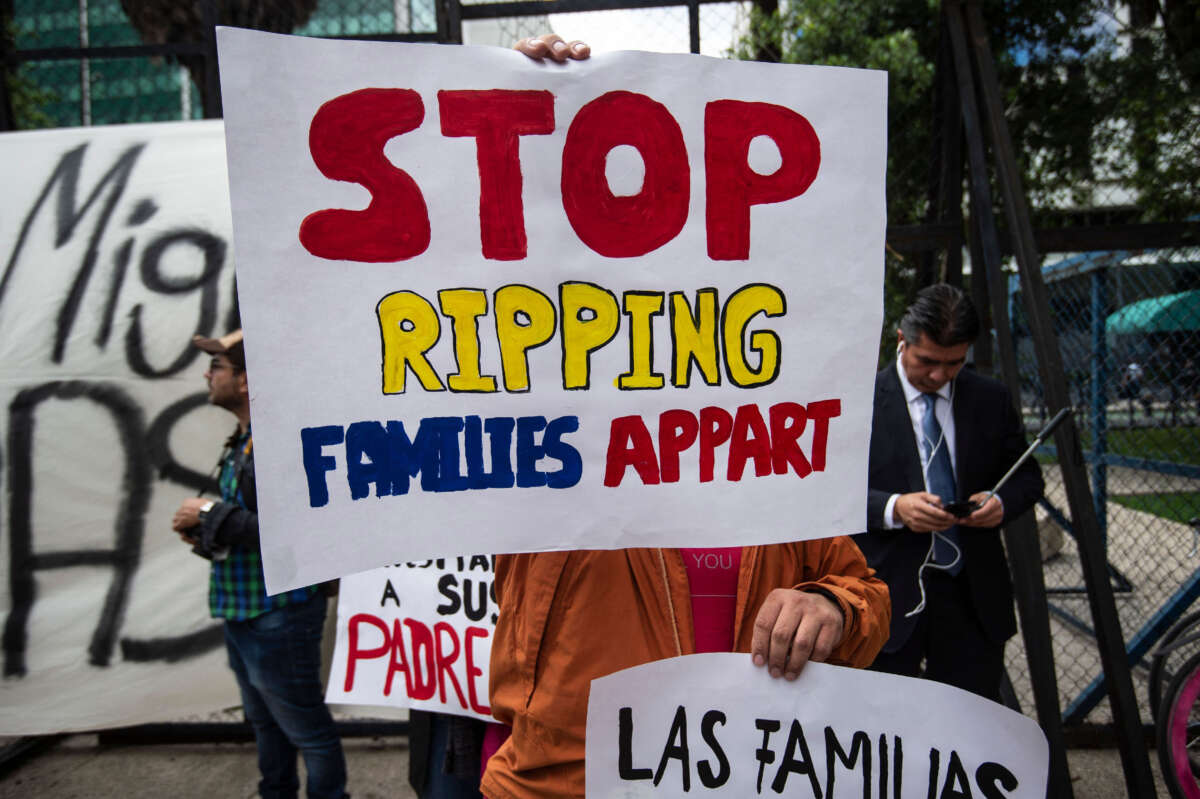The U.S. Justice Department is attempting to dismiss a lawsuit filed on behalf of a migrant woman who says she was forcibly separated from her son while seeking asylum at the border, resulting in extreme emotional distress.
Leticia and her 15-year-old son, Yovany, crossed the U.S.-Mexico border in 2017 to escape persecution and gang violence in Guatemala, and were separated for two years before being reunited.
“Whenever his mother comes to wake him up,” court papers state, “Yovany still wakes up suddenly in a panic, thinking she is an immigration officer coming to tell him that they had been separated.”
The lawsuit, filed by the Asylum Seeker Advocacy Project in federal court, alleges that the family’s forced separation traumatized Leticia, who suffered untreated facial paralysis because of the separation from her son. Government officials and the detention facility left her condition untreated, despite recognizing that she required medical attention.
“Her right eye became swollen shut, and she could not see out of it. She could not chew. She felt like her face was twisting and her body was frequently trembling. Leticia believes her facial paralysis was caused by the trauma of separation from her son,” the lawsuit claims.
Customs and Border Protection (CBP), Immigration and Customs Enforcement (ICE), and the Office of Refugee Resettlement (ORR) refused to tell Leticia or Yovany any information about the other’s whereabouts or wellbeing.
Yovany was imprisoned in a different migrant jail from his mother and then transferred to a government-subsidized shelter for unaccompanied children in Mesa, Arizona. The conditions at that facility were dismal, and the shelter’s employees have faced numerous disturbing allegations of abuse.
“The conditions at Casa Kokopelli were unsanitary and harsh. The temperature was kept extremely low, and Yovany and other children detained frequently complained that they were cold to officials, but they did not raise the temperature,” the lawsuit states.
In June 2018, Leticia agreed to deportation to secure her son’s release from detention. Yovany was then released to a foster family in Texas. The two were not reunited until her return to the United States in January 2020.
“Leticia suffered from extreme anxiety and depression during the prolonged separation. She feared for her own safety in Guatemala and worried about her son’s well-being in foster care in the United States,” the complaint says. “To this day, Leticia continues to experience symptoms related to her detention and separation from her son, and she has been diagnosed with Major Depressive Disorder.”
The lawsuit alleges that the government instituted an unlawful family separation policy in July 2017, with the intent to forcibly separate asylum-seeking parents from their children. Under this policy, the government forcibly separated thousands of asylum-seeking families and was not prepared to track separations. Because the government had no system in place to reunite separated children with their parents, the government lost track of tens of thousands of children, and hundreds of parents and children remain separated to this day.
“The cruelty of this policy and the trauma it inflicted on thousands of families was not an unforeseen or incidental byproduct — it was the government’s very goal,” the lawsuit states.
The Justice Department has asked the judge to dismiss the case, arguing that these claims involve “discretionary” decisions “susceptible to policy analysis”, rather than illegal misconduct. Therefore, the government argues that they can not be held liable for the alleged mistreatment of Leticia and Yovany and their subsequent emotional distress.
“No family should have been separated, and the justice department should be confronting its current challenges — and not protecting an administration that has come and gone,” Michael Wildes, an immigration lawyer and the mayor of Englewood, New Jersey, told The Guardian. “The Biden administration is defending policy that was unacceptable to America, and our national heritage of immigration.”
Our most important fundraising appeal of the year
December is the most critical time of year for Truthout, because our nonprofit news is funded almost entirely by individual donations from readers like you. So before you navigate away, we ask that you take just a second to support Truthout with a tax-deductible donation.
This year is a little different. We are up against a far-reaching, wide-scale attack on press freedom coming from the Trump administration. 2025 was a year of frightening censorship, news industry corporate consolidation, and worsening financial conditions for progressive nonprofits across the board.
We can only resist Trump’s agenda by cultivating a strong base of support. The right-wing mediasphere is funded comfortably by billionaire owners and venture capitalist philanthropists. At Truthout, we have you.
We’ve set an ambitious target for our year-end campaign — a goal of $250,000 to keep up our fight against authoritarianism in 2026. Please take a meaningful action in this fight: make a one-time or monthly donation to Truthout before December 31. If you have the means, please dig deep.
